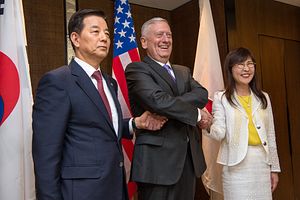I’ve tried not to make a habit of commenting on U.S. President Donald J. Trump’s outlandish tweets, but a series on Tuesday merits mention for the seriously unsettling effect it could have on U.S. allies and partners across the world.
Two days after five Arab states — Saudi Arabia, Egypt, the United Arab Emirates, Bahrain, and Yemen — cut diplomatic ties with Qatar on accounts of it allegedly supporting terrorism in the region, Trump took to Twitter to take credit for the development:
So good to see the Saudi Arabia visit with the King and 50 countries already paying off. They said they would take a hard line on funding… extremism, and all reference was pointing to Qatar. Perhaps this will be the beginning of the end to the horror of terrorism!
He also added: “During my recent trip to the Middle East I stated that there can no longer be funding of Radical Ideology. Leaders pointed to Qatar – look!”
There are a couple unsettling consequences from this series of events. First, the decision to alienate Qatar within the region, which now has the U.S. president’s public imprimatur, does not appear to have been broadly planned for or supported by the rest of the U.S. government.
Second, Trump’s announcement of the decision on Twitter all but explicitly confirms that he was led to the conclusion that Qatar ought to be alienated by other leaders — likely from Saudi Arabia. (“Leaders pointed to Qatar.”)
Third, Trump does not appear to be aware of the existing U.S. military presence in Qatar, a major U.S. partner in the region. Qatar, for example, hosts the United States Air Force’s Combined Air Operations Center at Al-Udeid Air Base, which provides command and control for U.S. military operations throughout 20 countries.
The episode reveals that the U.S. president is willing to capriciously drop important U.S. partners with little prior signaling. The consequences won’t go unnoticed in the Asia-Pacific, where questions about U.S. resolve and commitments loom large.
As was apparent at the Shangri-La Dialogue this past weekend, where U.S. Secretary of Defense James Mattis delivered a detailed major foreign policy address, U.S. allies and partners alike are beginning to see the words of even well-regarded agents of the Trump government as hollow in light of the president’s tendency to take important decisions himself, without anything close to whole-of-government message discipline or coordination.
This Qatar episode is far from the first of these decisions — even just in the past month. As Politico reports today, Trump’s remarkable decision to withhold support for NATO’s Article 5 in his speech in Belgium in May was also borne of his own decision-making, embarrassing advisers and cabinet officials ranging from National Security Advisor H.R. McMaster to Secretary of State Rex Tillerson to Mattis, all of whom had given assurances that he would affirm support for the article, which represents the cornerstone of the alliance.
Moreover, as I discussed in these pages, Trump’s willingness to casually hint at outrageous demands of allies, such as suggesting that South Korea cough up $1 billion for a missile defense system, further adds to perception that the U.S. president is a chaotic agent who is not beholden to any grand design or conception of solidarity between states.
Mattis’ task in Singapore was challenged first by the U.S. decision to pull out of the Paris agreement on climate, which occurred on the eve of the Shangri-La Dialogue. Now, Trump has bookended an already uneasy weekend of reassurance-provision by Mattis and Tillerson in Asia with another chaotic decision.
Finally, it’s worth emphasizing that the problem with these decisions from Trump is the manner in which they are made. Yes, there are reasonable and evidence-based cases for why Qatar may be a troublesome U.S. ally, why NATO’s other member states should increase their defense spending, and why South Korea may be reasonably asked to shoulder some of the burden for missile defense.
The problem with Trump’s decisions in each of these cases is that they may well have been made with a Magic 8-Ball. Despite what other agents of this government say across the world, the president does as he pleases.
While that may be his right as the apex of the U.S. government’s executive branch, the message it sends across the world is disturbing: The United States is a chaotic variable in world affairs and no longer a reassuring constant.

































